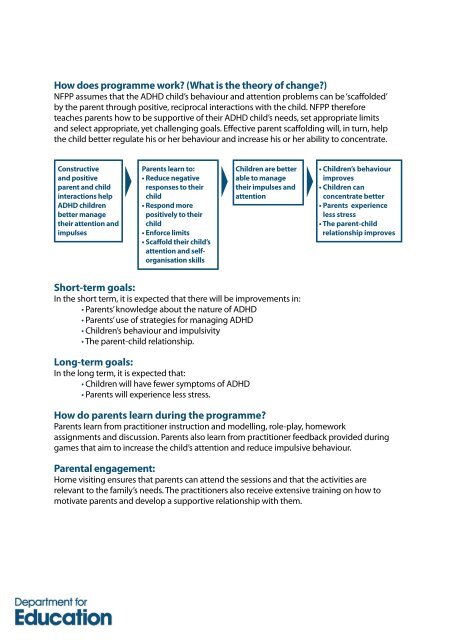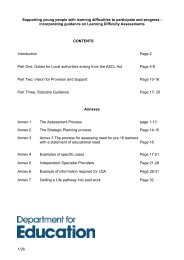The New Forest Parenting Programme (NFPP)
The New Forest Parenting Programme (NFPP)
The New Forest Parenting Programme (NFPP)
You also want an ePaper? Increase the reach of your titles
YUMPU automatically turns print PDFs into web optimized ePapers that Google loves.
How does programme work? (What is the theory of change?)<br />
<strong>NFPP</strong> assumes that the ADHD child’s behaviour and attention problems can be ‘scaffolded’<br />
by the parent through positive, reciprocal interactions with the child. <strong>NFPP</strong> therefore<br />
teaches parents how to be supportive of their ADHD child’s needs, set appropriate limits<br />
and select appropriate, yet challenging goals. Effective parent scaffolding will, in turn, help<br />
the child better regulate his or her behaviour and increase his or her ability to concentrate.<br />
Constructive<br />
and positive<br />
parent and child<br />
interactions help<br />
ADHD children<br />
better manage<br />
their attention and<br />
impulses<br />
Parents learn to:<br />
• Reduce negative<br />
responses to their<br />
child<br />
• Respond more<br />
positively to their<br />
child<br />
• Enforce limits<br />
• Scaffold their child’s<br />
attention and selforganisation<br />
skills<br />
Short-term goals:<br />
In the short term, it is expected that there will be improvements in:<br />
• Parents’ knowledge about the nature of ADHD<br />
• Parents’ use of strategies for managing ADHD<br />
• Children’s behaviour and impulsivity<br />
• <strong>The</strong> parent-child relationship.<br />
Long-term goals:<br />
In the long term, it is expected that:<br />
• Children will have fewer symptoms of ADHD<br />
• Parents will experience less stress.<br />
Children are better<br />
able to manage<br />
their impulses and<br />
attention<br />
• Children’s behaviour<br />
improves<br />
• Children can<br />
concentrate better<br />
• Parents experience<br />
less stress<br />
• <strong>The</strong> parent-child<br />
relationship improves<br />
How do parents learn during the programme?<br />
Parents learn from practitioner instruction and modelling, role-play, homework<br />
assignments and discussion. Parents also learn from practitioner feedback provided during<br />
games that aim to increase the child’s attention and reduce impulsive behaviour.<br />
Parental engagement:<br />
Home visiting ensures that parents can attend the sessions and that the activities are<br />
relevant to the family’s needs. <strong>The</strong> practitioners also receive extensive training on how to<br />
motivate parents and develop a supportive relationship with them.
















